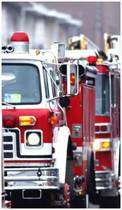The Appellate Division recently addressed the scope of N.J.S.A. 40A:14-68, which allows a municipality to exercise “supervision and control” over a volunteer fire company, designated as its official firefighting organization. In Newfield Fire Co. No. 1 v. Borough of Newfield, the Superior Court of New Jersey, Appellate Division upheld an ordinance adopted by the Borough of Newfield to regulate its volunteer fire company.
The Legal Background
Many New Jersey municipalities cannot support a full-time municipal fire department and must rely on volunteer fire companies, which have been recognized as quasi-public in nature. The New Jersey Legislature addressed the nature of municipal control of volunteer fire companies in N.J.S.A. 40A:14-68(a), which provides:
In any municipality not having a paid or part-paid fire department and force, the governing body, by ordinance, may contract with a volunteer fire company or companies in such municipality, for purposes of extinguishing fires, upon such terms and conditions as shall be deemed proper. The members of any such company shall be under the supervision and control of said municipality and in performing fire duty shall be deemed to be exercising a governmental function; however, the appointment or election of the chief of the volunteer fire company shall remain the prerogative of the membership of the fire company as set forth in the company’s certificate of incorporation or bylaws.
The Facts of the Case
Plaintiff Newfield Fire Company No. 1 (the “Fire Company”), a nonprofit, volunteer fire organization has provided firefighting services to defendant, Borough of Newfield (the “Borough”) for decades, although the two parties lacked a formal agreement. The relationship between the Fire Company and the Borough was harmonious until 2009, when the Fire Company’s membership elected a new Fire Chief.
In December 2010, the Borough adopted Ordinance #2010-11, which recognized the Fire Company as the sole firefighting organization in the Borough and provided the Borough “shall require the execution of all necessary agreements with the [Fire Company] to provide fire-fighting services.” The Borough presented the Fire Company with a contract for firefighting services, but it was rejected. The next year, the Borough passed an amendment authorizing the Borough to exercise broader control over the Fire Company’s general operations.
In 2013, the Borough enacted Ordinance #2013-7, which required all fire company line officers, including the chief, to be appointed by the Borough’s governing body. The Fire Company subsequently filed a complaint in lieu of prerogative writs, seeking to invalidate Ordinance #2013-7 as ultra vires. The suit alleged that the ordinance represents an invalid imposition of control over the affairs and internal governance of the Fire Company.
Subject to three exceptions which were declared unenforceable, the trial court concluded that the ordinance was a valid and enforceable exercise of municipal authority, permitted by N.J.S.A. 40A:14-68. The invalidated provisions authorized the Borough to appoint the Fire Chief; required the Fire Company to submit its bylaws, and presumably any amendments, to the Borough Council for approval; and provided that the Borough would retain ownership and control over the sign erected in front of the municipal building.
The Appellate Division’s Determination
The Appellate Division affirmed the trial court’s decision. In so ruling, the Court rejected the Fire Company’s argument that the Borough’s use of an ordinance ignored statute’s requirement of providing a contract with the Fire Company to define the scope of governmental supervision and control. Instead, the court concluded that the plain language of the statute provides the municipality’s “governing body, by ordinance, may contract with a volunteer fire company . . . .”
The Appellate Court further explained:
[Th]ese words unambiguously permit a municipality to use the mechanism of an ordinance as the contractual basis to set forth provisions assuring municipal supervision and control of members of the volunteer fire company it designates as the official entity to perform the public function of extinguishing fires. Such a reading is consistent with prior interpretations of both the statute and a municipality’s relationship with its volunteer fire company.
The Appellate Division also rejected the Fire Company’s argument that the Borough lacks authority to regulate the Fire Company, its members, or officers on the basis that the Fire Company is a private nonprofit corporation, separate and distinct from the Borough. Rather, the Court stated that the “broad, general nonprofit corporation statute yields to the specific legislative direction governing a municipality’s supervision and control of a designated volunteer fire company.”
The Court further stated that the Fire Company requires municipal supervision because it performs a public service. Despite the authority conveyed under N.J.S.A. 40A:14-68(a), the Court agreed that a municipality “cannot dictate the day-to-day operations of the department.” Accordingly, the Court stated that the Borough may not retain the right to approve the elected Fire Chief or the Fire Company’s bylaws, including any amendments. With those provisions excised, the Court concluded that the ordinance presents a valid enforceable contract to the Fire Company.
For more information about this case or the legal issues involved, we encourage you to contact a member of Scarinci Hollenbeck’s Government Law Group.

